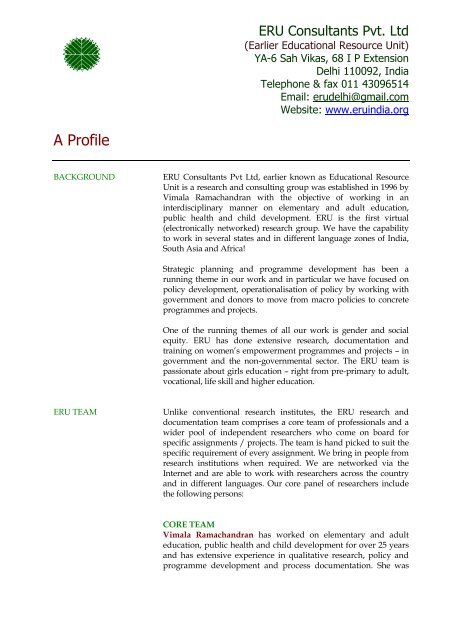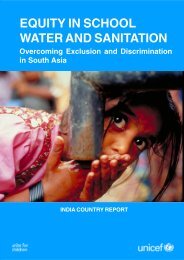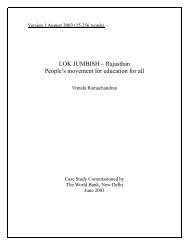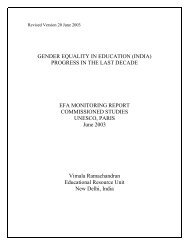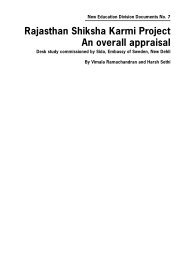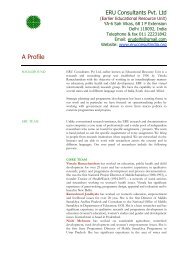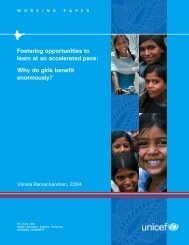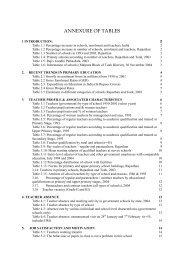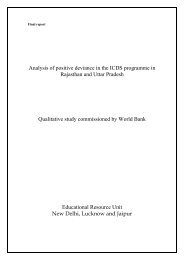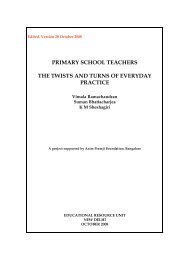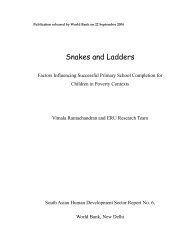A Profile - ERU Consultants Pvt. Ltd.
A Profile - ERU Consultants Pvt. Ltd.
A Profile - ERU Consultants Pvt. Ltd.
You also want an ePaper? Increase the reach of your titles
YUMPU automatically turns print PDFs into web optimized ePapers that Google loves.
<strong>ERU</strong> <strong>Consultants</strong> <strong>Pvt</strong>. <strong>Ltd</strong>(Earlier Educational Resource Unit)YA-6 Sah Vikas, 68 I P ExtensionDelhi 110092, IndiaTelephone & fax 011 43096514Email: erudelhi@gmail.comWebsite: www.eruindia.orgA <strong>Profile</strong>BACKGROUND<strong>ERU</strong> <strong>Consultants</strong> <strong>Pvt</strong> <strong>Ltd</strong>, earlier known as Educational ResourceUnit is a research and consulting group was established in 1996 byVimala Ramachandran with the objective of working in aninterdisciplinary manner on elementary and adult education,public health and child development. <strong>ERU</strong> is the first virtual(electronically networked) research group. We have the capabilityto work in several states and in different language zones of India,South Asia and Africa!Strategic planning and programme development has been arunning theme in our work and in particular we have focused onpolicy development, operationalisation of policy by working withgovernment and donors to move from macro policies to concreteprogrammes and projects.One of the running themes of all our work is gender and socialequity. <strong>ERU</strong> has done extensive research, documentation andtraining on women’s empowerment programmes and projects – ingovernment and the non-governmental sector. The <strong>ERU</strong> team ispassionate about girls education – right from pre-primary to adult,vocational, life skill and higher education.<strong>ERU</strong> TEAMUnlike conventional research institutes, the <strong>ERU</strong> research anddocumentation team comprises a core team of professionals and awider pool of independent researchers who come on board forspecific assignments / projects. The team is hand picked to suit thespecific requirement of every assignment. We bring in people fromresearch institutions when required. We are networked via theInternet and are able to work with researchers across the countryand in different languages. Our core panel of researchers includethe following persons:CORE TEAMVimala Ramachandran has worked on elementary and adulteducation, public health and child development for over 25 yearsand has extensive experience in qualitative research, policy andprogramme development and process documentation. She was
Educational Resource Unit – A profile Page 2____________________________________________________________________________________the first National Project Director of Mahila Samakhya (1988-1993),a founder Trustee of HealthWatch (1994-2007) – a network of socialactivists and researchers working on women’s health issues. Vimalahas significant experience of grant making, programme design,appraisal and evaluation and is based in New Delhi. Vimala hasbeen a mentor to chief executive officer and heads of programmepersonnel involved in grant making, monitoring and evaluationand documentation. She is based in New Delhi.Kameshwari Jandhyala has worked on women’s education,empowerment and livelihood issues for over 20 yeas. She is the firstDirector of Mahila Samakhya Andhra Pradesh and Consultant tothe National Office of Mahila Samakhya in Department ofEducation, GOI. She is a keen researcher and has significantexperience in qualitative research and programme development ineducation (women’s education), women’s studies and gender anddevelopment issues. Kameshwari is based in Hyderabad.Nishi Mehrotra has worked on sustainable agriculture,watershed development, rural development and women’sempowerment issues. She is the first State Programme Director ofMahila Samakhya Programme in Uttar Pradesh. She hassignificant experience in the area of water and sanitation and is ahighly skilled qualitative researcher and has extensive fieldworkexperience. She is based in Lucknow and has significant groundlevel experience in Uttar Pradesh, Uttarakhand, Bihar andJharkhand. Nishi is based in Lucknow.Shanti Menon, has a C.A.S. degree [equivalent to an M.Phil] ineducation from Syracuse University, New York and over 20 yearsexperience in designing and conducting qualitative andquantitative research and evaluation, managing research projects,developing and writing grant proposals and teaching courses inresearch methods. Her areas of interest include secondary andhigher education, educational policy, and public health. She isparticularly interested in the intersection of gender, caste andclass with macro level political, social, cultural and economicforces. She is based in Kerala.Bharat Patni, an engineer from IIT Roorkee with an MBA fromIIM Ahmedabad, has 32 years of domestic and internationalexperience in the corporate sector. He then transited into thedevelopment sector and spent six years with Pratham, Mumbaiproviding full time support on issues related to generalmanagement, donor coordination, MIS, finance and programmeplanning / development. He has travelled extensively in thecountry in connection with Pratham interface with thegovernment in Primary Education. He joined <strong>ERU</strong> group in 2006and has anchored / managed multi-state research projects. Hebrings quantitative research skills to the <strong>ERU</strong> management team.Bharat is based in New DelhiVani Periodi, independent researchers, trainer and experiencedqualitative researcher based in Mangalore, Karnataka. She wasthe District Coordinator of Mahila Samakhya in Mysore Districtand a MacArthur Fellow 2003-2005. She is part of a network of
Educational Resource Unit – A profile Page 3____________________________________________________________________________________RESEARCH AND DOCUMENTATION:trainers based in Karnataka. She leads <strong>ERU</strong> qualitative researchstudies in Karnataka. Vani is based in Mangalore.Niti Saxena, has been a part of <strong>ERU</strong> team since inception and shehas significant experience in quantitative as well as qualitativeresearch. She has worked on child rights, women’s rights andeducation and development issues. Niti is the former ExecutiveDirector of AALI (a feminist legal advocacy and research groupheadquartered in Lucknow). She leads / anchors <strong>ERU</strong>’s fieldprojects across northern India. Niti is based in Lucknow.Harsh Sethi, Consulting Editor of Seminar Magazine with overthirty years of engagement with civil society issues, non-partypolitical formations and non-governmental organisations. He hasspecial expertise in analysis and interpretation of qualitative andquantitative data. He oversees <strong>ERU</strong> projects with a view to ensurequality of outcome. He is based in New Delhi.2009 (Ongoing) UNESCO, Asia Pacific Programme for Education for All,Bangkok: Advocacy brief on Gender issues in higher education.2009 (Ongoing) Save the Children, Bal Raksha Bharat, New Delhi: NutritionPolicy Brief. A research based advocacy brief for SC BRP, India.2009 (Ongoing) Tata Institute of Social Sciences, Mumbai: Assessing thecoverage and effectiveness of national efforts to provide qualitymaternity protection for all. A qualitative study in Uttar Pradesh,India.2009 Effective Intervention & London School of Economics (UK):Qualitative and quantitative study of situation of elementaryeducation in Guinea Bissau.2009 UNICEF (ROSA), Kathmandu: Water, sanitation and education:exploring inclusion and exclusion – a qualitative study in twodistricts of Uttar Pradesh.2008-09 (ongoing) Sir Dorabji Tata Trust, Mumbai and Zubaan, New Delhi: Part IIof Cartographies of Empowerment – Tracing the Journey ofMahila Samakhya 1988 to 2008. A study conducted in partnershipwith Mahila Samakhya units in 9 States of India and ten researchpartners.2008 Plan International, India, Baseline survey of elementary schools inBihar & Uttar Pradesh2008 Save the Children (UK), Scoping study on nutritional status ofchildren and opportunities for improving the nutritional levels ofchildren in India.
Educational Resource Unit – A profile Page 4____________________________________________________________________________________2007-08 Plan International, India, Baseline survey of primary schools inRajasthan, Andhra Pradesh and Uttarakhand,2007-08 Azim Premji Foundation, Teacher development in India –mapping the terrain. (contemporary history of teacher developmentin India)2007 UNICEF ROSA, Kathmandu, Girls health and education in SouthAsia – a research based study on the situation in 8 countries(Afghanistan, Pakistan, India, Bhutan, Nepal, Bangladesh,Maldives and Sri Lanka).2007 Oxfam, India: Basic Education in India – the situation on theground and exploring possibilities for intervention.2006-07 NUEPA, UNESCO and Department of Education, MHRD, GOI,Mid-term Assessment of MDG goals and EFA – three chapters (a)Progress made in Uttar Pradesh by Nishi Mehrotra, (b) Progressmade in Andhra Pradesh by Kameshwari Jandhyala and (c)Thematic review of Education and Equity by VimalaRamachandran.2006-07 Plan International India, New Delhi, Research study on theHidden Cost of Education in 4 states – Andhra Pradesh,Maharashtra, Orissa and Rajasthan.2005-2007 International Labour Organisation, New Delhi and Governmentof India, Department of School Education and Literacy, NewDelhi: Improving the quality of education in government schools– caste studies of programmes with potential for replicationcovering Andhra Pradesh, Tamil Nadu, Nagaland, Maharashtra,Rajasthan, Assam, Uttaranchal, Uttar Pradesh etc.2005-2006 Royal Netherlands Embassy, New Delhi: Cartographies ofEmpowerment – Tracing the Journey of Mahila Samakhya 1988 to2005. A study conducted in partnership with Mahila Samakhyaunits in 9 States of India and ten research partners.2004-05 Oxfam N(O)VIB: Systemic issues and strategies to promoteequity and quality in elementary education – a qualitativeresearch study in Andhra Pradesh and Rajasthan.2004-05 Knowledge and Skills for Development and IDS Sussex: theIndia study in Rajasthan, part of a multi-country study on TeacherMotivation (Elementary Education) .2004 World Bank, Study on Positive deviance in ICDS – exploring thefactors that contribute towards better performance of theprogramme in select development blocks of Rajasthan and UttarPradesh.
Educational Resource Unit – A profile Page 5____________________________________________________________________________________2003 DFID, India: An evaluation of Balika Shikshan Shivir (residentialeducational programme for out of school girls), Lok JumbishProject, Rajasthan.2002-03 World Bank, Qualitative research study: Factors that facilitate /impede successful primary school completion - children indiverse poverty situations in Uttar Pradesh, Karnataka andAndhra Pradesh.2000-01 DFID, on approval of DPEP Bureau, GOI, Backward and forwardlinkages – ten case studies in primary education.2000 NIEPA and European Commission, Community Participation inPrimary Education with special focus on innovations inRajasthan.1999-2000 Department of Education, GOI and NIEPA (as a part of the EFA2000), Assessment Education and the status of women, exploringlinkages and identifying constraints.1998 Engendering Development: Lessons from Social SectorProgrammes (with special focus on primary education) in India –independent <strong>ERU</strong> research, with concrete examples from the twofields, that has fed into gender sensitisation training of a widerange of development agencies and organisations. Adapted forthe education and health sector.1996 - 1997 ASPBAE, New Delhi, and UNESCO PROAP, Bangkok; Four-Country study on the status of women's and girl's education inSouth Asia (India, Bangladesh, Pakistan and Nepal). Asia SouthPacific Bureau for Adult Education. This project involvedidentifying teams from researchers from Pakistan, Bangladeshand Nepal and working with them over a period of eighteenmonths.1996 UNDP, New Delhi, Redefining Safety Net: Inter-linkagesbetween education, credit, women’s collective and empowermentas the safety net.1996 UNICEF and Government of Andhra Pradesh, CriticalConsciousness, credit and productive assets - key to sustainablelivelihood.1996 Integrating a gender concerns in mainstream programmes andinstitutions, UNICEF and Department of Women and ChildDevelopment, GOI. This research paper was followed by trainingof specific state office and area specific teams in UNICEF.REVIEW AND EVALUATION
Educational Resource Unit – A profile Page 6____________________________________________________________________________________2009 The Children’s Education Fund Foundation, UK: Qualitativeconcurrent review of the Aid India programme in Tamil Nadu,India2008 Room to Read, New Delhi. Impact assessment of Room to Growscholarships for adolescent girls in Delhi and Uttarakhand.2006 & 2007 Department of Elementary Education, MHRD, Government ofIndia: National evaluation (in 2 parts covering 24 states in India)of Kasturba Gandhi Balika Vidhyalaya and National Programmefor Girls Education in the Elementary Sector. VimalaRamachandran was the Team Leader and Kameshwari Jandhyalaand Nishi Mehrotra were members of the evaluation team2007 Oxfam Novib, The Netherlands – Core Programme Evaluationfor India – focus on education and health.2007 American India Foundation, Review of the Digital EqualiserProgramme in Rajasthan, Orissa, Punjab and Andhra Pradesh.2006-08 Word Bank, New Delhi, Concurrent review and documentationof a multi-sectoral child development programme in MadhyaPradesh.2006-07 Save the Children, UK: Review of capacity building of NGOpartners in Tamil Nadu.2006 Sir Dorabji Tara Trust, Mumbai: Facilitating consultations toexplore the creation of a national level institute for education inIndia.2006 Sardar Patel Vidhyalaya, New Delhi: Education Audit2005 Save the Children, UK: Reviewing institutional mechanisms forintegrated child development and education in the tsunamiaffected areas of India.2004 Oxfam Lucknow: Analysis of the education policy of UttarPradesh and budget analysis.2003 UNICEF - Community participation in UNICEF supportedprogrammes in Uttar Pradesh, Orissa and Maharashtra.2003 SIDA, New Delhi - Appraisal of Tamil Nadu Primary SchoolImprovement Campaign, for2002 European Commission and GoI - Gender and social equity inDPEP – an overall impact assessment.2001 Forut, Save the Children Fund of Norway and Sweden – Tenyear review of The Concerned for Working Children.
Educational Resource Unit – A profile Page 7____________________________________________________________________________________2000 Group of donors including Dorabji Tata Trust, Mumbai – Tenyear review of Kutch Mahila Vikas Sangathan, Bhuj:1999-2000 SIDA, New Delhi – Appraisal of Shiksha Karmi Project ofRajasthan1999 HIVOS, Bangalore – Grant review of Navsarjan Trust,Ahmedabad:1996 Ford Foundation, New Delhi – Review of Multiple ActionResearch Group, New Delhi:1996 and 2000 HIVOS, Bangalore – Ten and then fifteen year reviewAgragamee, Kashipur, Orissa.POLICY / PROGRAMME REVIEW AND DEVELOPMENT:2007 Oxfam N(o)vib, Reformulating and training Urmul Trust, Bikanerto enable them to develop their proposal from rights basedperspective.2005-07 World Bank, New Delhi, Documentation and concurrent reviewof a pilot project in Madhya Pradesh for integrated childdevelopment.2006 Department of Education, MHRD, GoI - Chairing and draftingof the report of the Sub-group on girls’ education for theformulation of the XI Plan.2004 Department of Education, MHRD, GoI - <strong>ERU</strong> led the teams inGujarat and Bihar doing the national evaluation of MahilaSamakhya Programme.2004 Sesame Street, India: Background paper on status of elementaryeducation in India.2004 Ace Global Private Limited and Delegation of the EuropeanCommission, New Delhi: Technical assistance for theidentification phase of EC state partnership programme withChhattisgarh.2004 Department of Education, GoI and UNICEF: Facilitating regionaland state level planning workshops on National Programme forGirls Education at the Elementary Level (NPEGEL) for state anddistrict level administrators.2004 Swedish International Development Cooperation Agency(SIDA), Vientiane, Lao PDR: Gender Audit Study of DemandDriven Approach to basic Education for All in Lao PDR.
Educational Resource Unit – A profile Page 8____________________________________________________________________________________2003 UNESCO, Paris: Global Monitoring Report 2003:(a) Gender equality in education (India) – progress in the lastdecade(b) Empowering Education: the Mahila Samakhya experience2003 The World Bank:(a) Case study of Lok Jumbish (Education for All) Project ofRajasthan as an input into the MDG report;(b) Case study of Learning Guarantee Scheme of Government ofKarnataka and Azim Premji Foundation as ain input into theMDG report;(c) Case study of Madhya Pradesh Education Guarantee Scheme– a Social Inclusion and Empowerment Case Studies for:Shanghai Conference on Scaling up Poverty Reduction beingplanned by the World Bank.2003-2005 Naandi Foundation, Hyderabad and Government of AndhraPradesh• Strategic planning and hands on support to the elementaryeducation quality improvement project in Paderu area ofVishakhapatnam District• Strategic planning and resource support to the HyderabadCity elementary education quality improvement project2002 European Commission (New Delhi): Planning support andpreparation of approach paper to appraisal and pre-appraisal ofEuropean Commission support to Government of India’s SarvaShiksha Abhiyan2002 Swedish International Development Cooperation Agency(SIDA), New Delhi: Country Strategy Paper on Social SectorReform.2001 UNICEF, India Country Office, New Delhi: Strategic planningexercises in primary education – as member of Think Tank.2001 UNFPA, New Delhi: Facilitate 6 th Country Programme Cyclestrategic planning exercise.2001 Care, India: Basic Education in India advocacy strategy papercommissioned. This document is an input into their strategyplanning exercise in India.2000 Ford Foundation:(a) Santiago: Incorporating Women’s Health Concerns in HealthSector Reforms: Key Areas for Strategic Advocacy and CitizenParticipation.(b) Educational programmes for adolescents – with focus on outof-schoolchildren, New Delhi
Educational Resource Unit – A profile Page 9____________________________________________________________________________________2000 Nuffic, The Netherlands: Specialised inputs on gender andsocial equity issues in the European Commission primary andupper primary education project formulation mission1999 Consultant to SPARC (a Mumbai-based NGO) in a World Banksponsoredinitiative to review the experience of NGOinvolvement to promote women’s participation and communityinvolvement in World Bank-supported social sector developmentprojects in India.1999 N(O)VIB, The Netherlands: Education Project (NGO)Identification in India.1998 – 1999 DFID, India: Development of an education strategy for reachingout to children and young people in the 11 – 17 age group.1998 UNICEF, India Country Office, Government of Rajasthan andUNICEF Jaipur: Formulation of Government of Rajasthan policyfor women1997 Swedish International Development Cooperation Agency(SIDA), New Delhi: Rights, social justice and governance,exploring opportunities for NGO support in Rajasthan.1997 UNESCO:(a) Planning and executing an international trainingprogramme for educational administrators to integrategender issues into monitoring and evaluation system ofnon-formal education programmes. UNESCO PROAP,Bangkok(b) Co-ordinating regional consultative meetings (South andSouth east Asia) on Education for Survival jointly withNirantar, New Delhi, as a run-up to CONFENTEA V, IIE,Hamburg.1997-98 Swedish International Development Cooperation Agency(SIDA), New Delhi: Team leader - project formulation for a SIDAassistedReproductive and Child Health Project in seven districts ofRajasthan, India.TRAINING2009 (ongoing) DoEE&L, GOI and DFID, India: Training and capacity buildingof Mahila Samakhya programme personnel across India.2008-09 Mentoring and advising NEGFIRE, New Delhi
Educational Resource Unit – A profile Page 10____________________________________________________________________________________PUBLICATIONS ARISING OUT OF RESEARCH:BOOKS:1. (2008) Vimala Ramachandran: Health and girls education in South Asia: An essentialsynergy; UNICEF – UNGEI, Kathmandu2. (2008), Rashmi Sharma and Vimala Ramachandran: The Elementary Education System inIndia: A field based investigation into institutional structures, processes and dynamics,Routlege India.3. (2006) Leela Visaria and Vimala Ramachandran (Ed): Reality Check: Abortion in India,Routledge India, New Delhi.4. (2004) Vimala Ramachandran: Fostering opportunities to lean at an accelerated pace: Whydo girls benefit enormously? UNICEF Working Paper, New Delhi5. (2004) Vimala Ramachandran (Ed): Hierarchies of Access: Gender and Equity in PrimaryEducation; Sage Publications, New Delhi.6. (2004) Snakes and Ladders: Factors Influencing Successful Primary School Completion forChildren in Poverty Contexts; South Asian Human Development Sector Report No. 6,World Bank, New Delhi7. (2003) Vimala Ramachandran (Ed): Getting children back to school: case studies in primaryeducation; Sage Publications, New Delhi.8. (2001) Vimala Ramachandran and Harsh Sethi: Shiksha Karmi Project of Rajasthan – anoverall appraisal; New Education Division Document No 7, Swedish InternationalDevelopment Cooperation Agency9. (1998) Vimala Ramachandran: Girls and Women’s Education: Policies and ImplementationMechanisms – Case Study India; UNESCO-PROAP, Bangkok.10. (1998) Vimala Ramachandran (Ed) Bridging the gap between intention and action - Girlsand Women’s Education in South Asia, Editor the book and author of the Indianexperience, UNESCO-PROAP, Bangkok and ASPBAE, New Delhi, May.ARTICLES IN JOURNALS11. (2009) Vimala Ramachandran and Suman Bhattacharjea: Attend to primary school teachers,Vol. XLIV, No. 31, August 1, 2009 Economic and Political Weekly12. (2009) Vimala Ramachandran: Right to Education Act, Vol. XLIV, No 28, July 11, 2009,Economic and Political Weekly.13. (2009) Vimala Ramachandran: What is ‘para’ about some teachers? Vol. 34, No. 2, April-June 2009, VIKALPA (A journal of Indian Institute of Management, Ahmedabad)14. (2007) Vimala Ramachandran and Kameshwari Jandhyala: Strengthening the governmentschool system – lessons from India, Economic and Political Weekly, VOL 42 No. 48December 01 - December 07, 200715. (2007): Vimala Ramachandran, Nishi Mehrotra and Kameshwari Jandhyala: Do incentivesmake a difference to meaningful education of socially underprivileged children? Journal ofEducational Planning and Administration, NUEPA, New Delhi16. (2006) Vimala Ramachandran, Education and livelihood, Seminar 563, June. New Delhi17. (2005) Vimala Ramachandran: Why school teachers are de-motivated and disheartened,Economic and Political Weekly, VOL 40 No. 21 May 21 - May 27, 200518. (2003) Vimala Ramachandran, Kameshwari Jandhyala and Aarti Saihjee: Through the lifecycle of children: factors determining successful primary school completion; Economic andPolitical Weekly, VOL 38 No. 47 November 22 - November 28, 200319. (2003) Vimala Ramachandran: Backward and forward linkages that strengthen primaryeducation in Economic and Political Weekly, March 8-14, Volume XXXVIII, No 10
Educational Resource Unit – A profile Page 11____________________________________________________________________________________20. (2002) Vimala Ramachandran and Aarti Saihjee: The New Segregation – reflections ongender and equity in primary education, Economic and Political Weekly; No 17 Vol.XXXVII, 27 April-2 May.21. (2001) Vimala Ramachandran: Community Participation in Primary Education –Innovations in Rajasthan; Economic and Political Weekly; Vol. XXXVI, June 2322. (1999) Vimala Ramachandran: Adult Education: A tale of empowerment denied; Economicand Political Weekly; Vol. XXXXIV, No 15 April 10.23. (1998) Vimala Ramachandran: Engendering Development: Lessons from Social SectorProgrammes in India: Indian Journal of Gender Studies, Vol. 5: 124. (1997) Leela Visaria and Vimala Ramachandran: Emerging issues in reproductive health,Economic and Political Weekly, Vol. 22, No 36, September 625. (1997) Vimala Ramachandran: Changing face of the development sector in India; VOICES,Volume 1, Number 226. (1996) Vimala Ramachandran: NGOs in the times of globalisation: from family planning toreproductive health; Seminar, November.27. (1996) Vimala Ramachandran: Fertility and women’s autonomy in the Indian Family; IndiaInternational Centre Journal Special Issue on Women And The Family, Winter28. (1995) Vimala Ramachandran: Equality among unequal partners - relationship betweenNGOs and the government in India, The Administrator, Lal Bahadur Shastri NationalAcademy of Administration, Mussoorie, July.CHAPTERS IN PUBLISHED BOOKS:29. (2009) Vimala Ramachandran: Quality, the Heart of Equity, in Cohen, Joel E., and Martin B. Malin,eds. 2009. International Perspectives on the Goals of Universal Basic and Secondary Education. NewYork: Routledge.30. (2009) Vimala Ramachandran: Democratic Inequalities: The Dilemma of Elementary Education inIndia, in Robert Cowen and Andrea M Kazamias (ed), International Handbook of Comparative Education,Volume II, Springer International Handbook of Education Series, The Netherlands31. (2009) Vimala Ramachandran: Systemic barriers to equity in education, in Preet Rustagi (Ed)Concerns, conflicts and cohesions: Universalisation of Elementary Education in India, Oxford UniversityPress, New Delhi32. (2008) Vimala Ramachandran, Kameshwari Jandhyala and Aarti Saihjee, Through the Life Cycle ofChildren: Factors that facilitate / Impede successful primary school completion; in Rama Baru (Ed)School Health Services in India: The Social ad Economic Contexts, Sage Publications, New Delhi33. (2008) Vimala Ramachandran, Kameshwari Jandhyala and Aarti Saihjee: Through the LifeCycle of Children: Factors that facilitate / impede successful primary school completion, inRama Baru (Ed) School Health Services in India, Sage Publications, New Delhi34. (2007) Vimala Ramachandran A school in every village – the Education Guarantee Scheme in MadhyaPradesh, India, in Deepa Nayayan and Elena Glinskaya (Ed) Ending Poverty in South Asia: Ideas thatWork, World Bank, Washington DC.35. (2006) Vimala Ramachandran and Aarti Saihjee, The New Segregation in Primary Education– Implications for Local Governance, in Amit Prakash (Ed), Local Governance in India,Oxford University Press, New Delhi36. (2005) Kameshwari Jandhyala: Working within and without, in Mandira Kumar and PadmaM Sarangapani (Ed), Improving Government Schools – What has been tried and whatworks, Sutradhar and Books for Change, Bangalore37. (2002) Vimala Ramachandran: Literacy, Development and Empowerment: ConceptualIssues, for edited book on Gender Gap in Basic Education Edited by Dr. Rekha Wazir; SagePublication, N Delhi38. (2002) Vimala Ramachandran: Education and the status of women; in India EducationReport Edited by Dr Govinda, Oxford University Press, New Delhi.
Educational Resource Unit – A profile Page 12____________________________________________________________________________________39. (1998) Vimala Ramachandran: Voluntary organisation, professional agency or subcontractor- the changing profile of the non-government sector in India, Dr. Pravin Visaria,M L Dantwala and Harsh Sethi (Eds.) Social Change through voluntary action, SagePublications New Delhi, September40. (1996) Vimala Ramachandran: Redefining Safety Net: in N Rao, L Rurap and R Sudarshan(Eds.): Sites of Change: The Structural Context for Empowering Women in India, UNDP /FES


